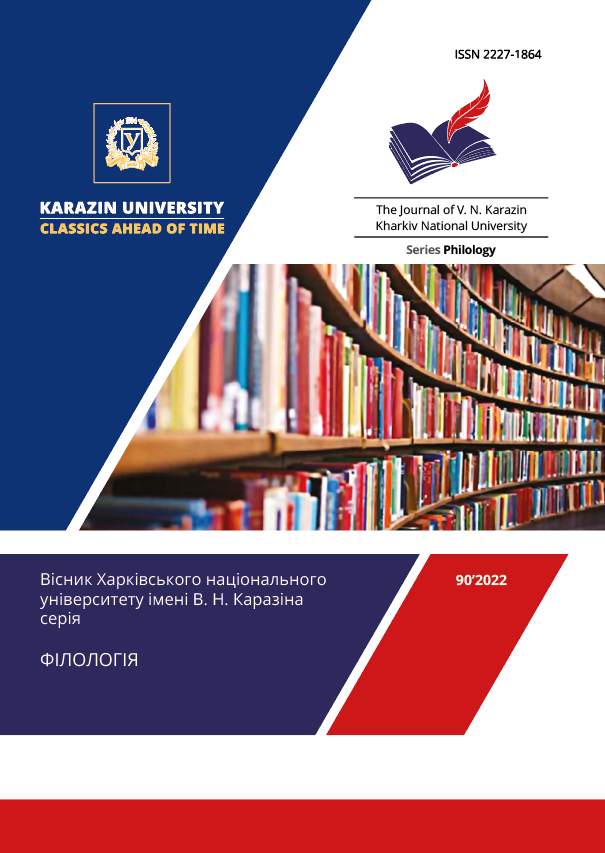Non-heroic heroes of the dystopia: the novel Never Let Me Go by Kazuo Ishiguro in the context of modern literature
Abstract
The article examines the features of the characters of the heroes of Kazuo Ishiguro's novel "Don't Let Me Go" in the context of the dystopia of the 21st century. Based on a comparison of the dystopias of the 20th century on the one hand, and dystopias of the 21st century on the other hand, the tendencies of the development of this genre and the principles of reflection of the world outlook of the heroes are traced. It is noted that a distinctive feature of 20th century dystopias is the conflict of heroes with the existing regime, while in the 21st century dystopias less attention is paid to this conflict than the problem of the psychological state of characters who have already realized that it is useless to fight the ideology of society. The purpose of the article is to study the character’s accentuation, previously not considered, of the characters of Kadzuo Ishiguro’s novel Don’t Let Me Go in the context of modern literature.
The heroine of the novel Katie S. is endowed with intellectual and moral qualities that, as it turned out, cannot change her fate as a “second class” person. Her friends Ruth and Tommy also have a non-standard outlook: each of them has their own inclinations and their own preferences. This aspect of the novel can be considered as protest, directed against the social structure that divides people into "first-class" and "second-class". One of the main conclusions: modern society, having become a "consumer society", loses the main feature of humanism – love and respect for every representative of humanity, depriving a person of will and thirst for life that was given by nature.
When analyzing Kazuo Ishiguro's novel Don't Let Me Go, critics often draw attention to the "Japanese" syndrome that is present in the English characters. The formula of "collective national thinking" does exist in the work, but it seems to be insufficiently covered in literary criticism. In our opinion, "Japanese" should be considered in two aspects: a) as traditional service to duty, acceptance of fate and humility in Japanese culture; b) as a lack of passionarity and a syndrome of learned helplessness, the features of which we observe in many modern "non-Japanese".
Downloads
References
Bauman Z. Individualizirovannoe obshchestvo. Moskva, 2002. 231 s.
Bodrijyar Zh. Prozrachnost` zla. Yaspers K. , BodrijyarZh. Prizraktolpy`. Moskva: Algoritm, 2007. 272 s.
Zozulya E. Rasskaz ob Ake i chelovechestve. URL: https://coollib.net/b/255629-efim-davidovich-zozulya-rasskaz-ob-ake-i-chelovechestve/read#t2 (data zvernennya 04.12.2021).
Kadzuo Ishiguro. Ne otpuskaj menya. Moskva: E`KSMO, 2020. 384 s.
Kostenkova V.V. Antiutopiya nachala XXI veka v dinamike zhanrovy`kh transformaczij: dis. kand. filolnauk: 10.01.01. FGBOU VO «Kubanskij gosudarstvenny`juniversitet», 2019. 180 s.
Lanin B.A. Anatomiya literaturnoj antiutopii. Obshhestvenny`e nauki i sovremennost`. 1993. #5. S. 154–163.
Morozova I.S. Krizis otvetstvennosti v kontekste razvitiya kul'tury informatsionnogo obshchestva: dis. kand. filol. nauk: 15.04.15. ANO VPO «Moskovskii gumanitarnyi universitet», 2015. 195 s.
Nesterenko Yu.S. E`lementy` yaponskoj kul`tury` v romane Kadzuo Ishiguro «Ne otpuskajmenya». Znanie. Ponimanie. Umenie. 2015. # 4. S. 326–333.
Strel`nikova L.Yu. Postmodernistskaya antiutopiya M. Ue`l`beka «Pokornost`»: poslednij dukhovny`j krizis evropejskogo mira. Vestnik VGU. Seriya: Filologiya. Zhurnalistika. 2019. # 1. S. 71–77.
Kazuo Ishiguro. Never Let Me Go. London. Faber & Faber, 2021. 304 с.
Maier S. F., Seligman M. E. P. Failure to escape traumatic shock. Journal of Experimental Psychology. 1967. May; 74(1): 1–9 p.
Rodin J., Langer E.J. Long-term effects of a control relevant intervention with the institutionalized aged. Journal of Personality and Social Psychology. 1977. No. 35. P. 897–902.




